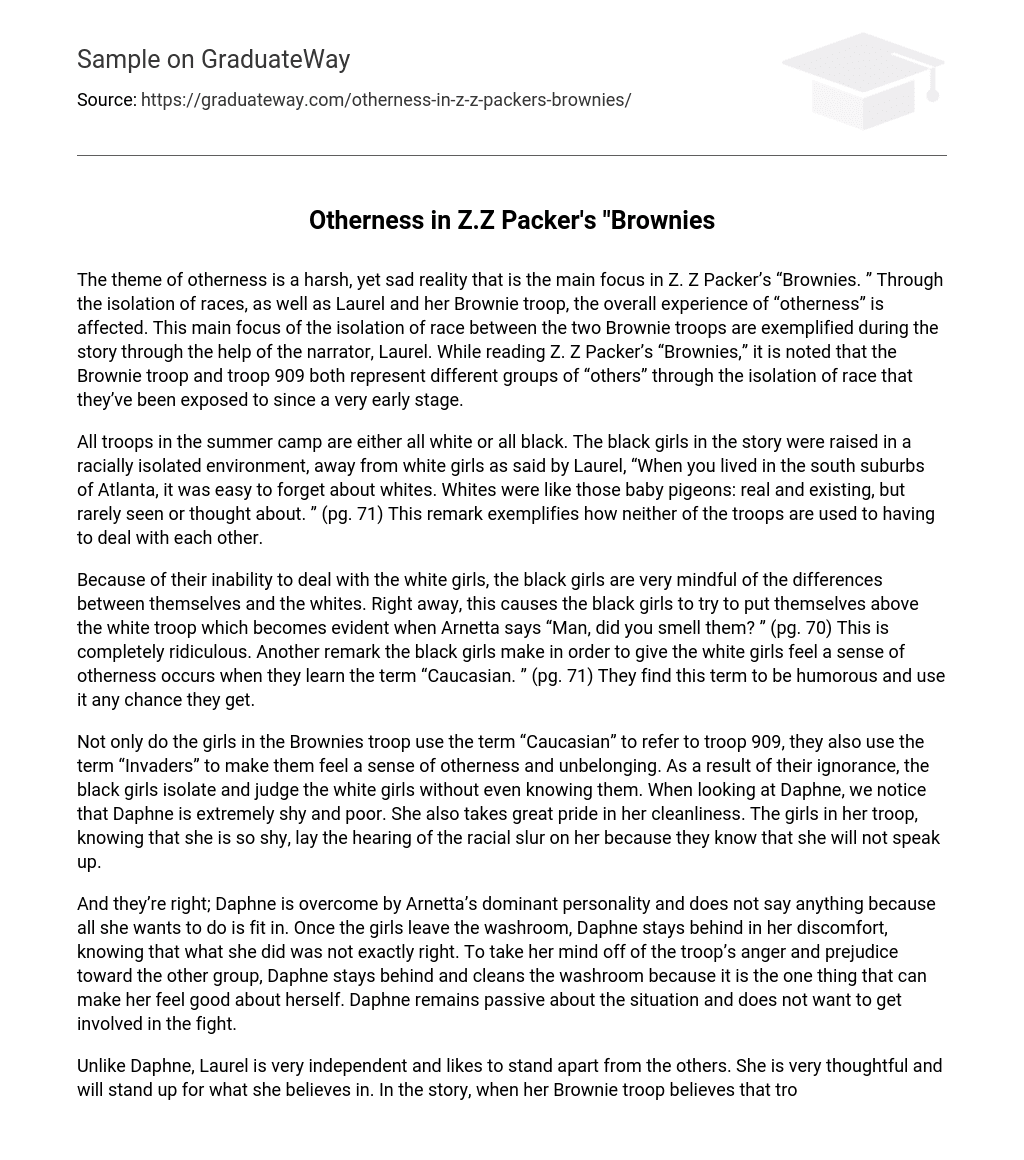The theme of otherness is a harsh, yet sad reality that is the main focus in Z. Z Packer’s “Brownies. ” Through the isolation of races, as well as Laurel and her Brownie troop, the overall experience of “otherness” is affected. This main focus of the isolation of race between the two Brownie troops are exemplified during the story through the help of the narrator, Laurel. While reading Z. Z Packer’s “Brownies,” it is noted that the Brownie troop and troop 909 both represent different groups of “others” through the isolation of race that they’ve been exposed to since a very early stage.
All troops in the summer camp are either all white or all black. The black girls in the story were raised in a racially isolated environment, away from white girls as said by Laurel, “When you lived in the south suburbs of Atlanta, it was easy to forget about whites. Whites were like those baby pigeons: real and existing, but rarely seen or thought about. ” (pg. 71) This remark exemplifies how neither of the troops are used to having to deal with each other.
Because of their inability to deal with the white girls, the black girls are very mindful of the differences between themselves and the whites. Right away, this causes the black girls to try to put themselves above the white troop which becomes evident when Arnetta says “Man, did you smell them? ” (pg. 70) This is completely ridiculous. Another remark the black girls make in order to give the white girls feel a sense of otherness occurs when they learn the term “Caucasian. ” (pg. 71) They find this term to be humorous and use it any chance they get.
Not only do the girls in the Brownies troop use the term “Caucasian” to refer to troop 909, they also use the term “Invaders” to make them feel a sense of otherness and unbelonging. As a result of their ignorance, the black girls isolate and judge the white girls without even knowing them. When looking at Daphne, we notice that Daphne is extremely shy and poor. She also takes great pride in her cleanliness. The girls in her troop, knowing that she is so shy, lay the hearing of the racial slur on her because they know that she will not speak up.
And they’re right; Daphne is overcome by Arnetta’s dominant personality and does not say anything because all she wants to do is fit in. Once the girls leave the washroom, Daphne stays behind in her discomfort, knowing that what she did was not exactly right. To take her mind off of the troop’s anger and prejudice toward the other group, Daphne stays behind and cleans the washroom because it is the one thing that can make her feel good about herself. Daphne remains passive about the situation and does not want to get involved in the fight.
Unlike Daphne, Laurel is very independent and likes to stand apart from the others. She is very thoughtful and will stand up for what she believes in. In the story, when her Brownie troop believes that troop 909 made a racial comment, Laurel is the only girl who does not believe it. She is the only girl in the entire group to give it a second thought. Through paying close attention to the characterization of Laurel and Daphne, we realize that they are the only two in their group who show each other respect.
For example, when Laurel was telling a story, Daphne says “Go on, Laurel” (pg. 78) moments after Octavia calls her “Snot” and tells her to “shut up” (pg. 78). This allows Laurel to finish her to story, as well as come to the realization that we are all the other in the end. There is always someone who will make you feel like an outcast. Someone is always trying to put others down in order to be on top. At the end of “Brownies”, it becomes evident that Daphne and Laurel are portrayed as the “others,” although the two of them seem to treat each other the best.
This shows how otherness is not always a bad thing. As a result of the isolation of races in Z. Z Packer’s “Brownies”, Daphne is the only one to help Laurel come to the realization that otherness does not necessarily have to do with race. It can merely be a part of human nature, or something that make people dislike those who are in the slightest way different. No matter what race, zodiac sign, religion, or character, people will jump at the chance to get even, and to for once make someone else feel like “the other. ”





